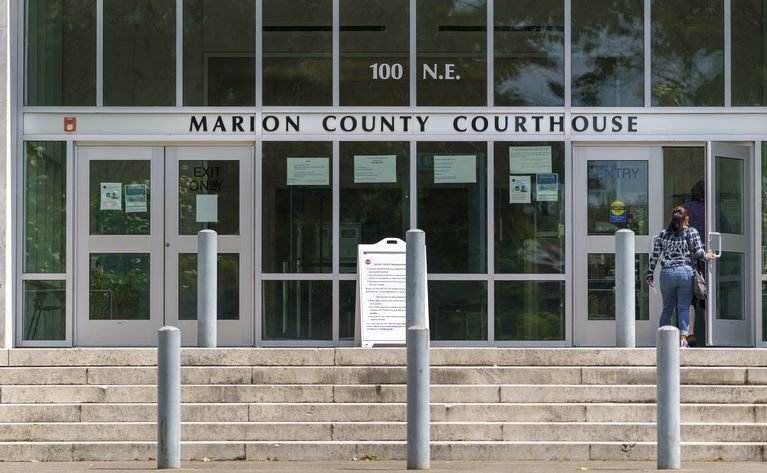Want Us To Contact You?
American Bar Association finds Oregon has just 1/3 of needed public defenders
The state has 31% of the attorneys necessary to address current caseload, American Bar Association report finds

Marion County Courthouse in Salem, Ore., May 19, 2021.
Kristyna Wentz-Graff / OPB
Oregon’s public defense system has less than one-third of the attorneys the state needs to adequately represent criminal defendants, according to a two-year study by the American Bar Association set to be released Friday.
The state contracts out all of its public defense work at the trial level to nonprofits and private attorneys through a state agency known as the Office of Public Defense Services.
“OPDS has 31% of the attorneys needed to address current caseload,” according to a slideshow from representatives of the ABA who presented their findings Thursday to OPDS commissioners and staff.
The ABA’s Committee on Legal Aid and Indigent Defense worked with the accounting firm Moss Adams. Together, they found Oregon has the equivalent of 592 full-time public defenders, but needs 1,888 to meet the current caseload. That translates into a 69% shortage, or 1296 public defenders.
“OPDS has a significant deficiency of (full time) attorneys that must be addressed,” the ABA stated in a slide presented Thursday. “This requires attorneys either to triage, choosing to prioritize some clients over others, or to have less time than necessary to serve each and every client.”
A defendant’s right to effective counsel is guaranteed under the Sixth Amendment of the U.S. Constitution. The ABA’s findings are the latest indicator to raise questions about whether Oregon is providing adequate defense to people who cannot afford an attorney.

Oregon State Capitol building, May 18, 2021. The capitol was completed in 1938.
Kristyna Wentz-Graff / OPB
A 2019 study funded by the Legislature found Oregon’s public defense system was essentially unconstitutional and provided financial incentives for attorneys to take as many cases as possible. While that’s since been addressed, other concerns raised in the report have not. The report found the state’s contracting system is a complex bureaucracy that makes oversight nearly impossible.
For the last several months, the shortage of public defenders has been so significant some indigent defendants have been in custody without an attorney.
“These are all poor people that do not have the resources to hire a lawyer,” OPDS’s executive director Steve Singer told OPB. “We didn’t get to this problem overnight. We got to this problem over the last two or three decades. The hard question is what do you do about the problem? How do you solve the problem?”
Singer, who took over the agency in December, plans to advocate for structural changes he said will create a more efficient public defense system in the long term. OPDS has more immediate concerns though, Singer said, including addressing a budget shortfall over the next two years. Even more immediate, the agency needs technology upgrades to better track and provide oversight of attorneys and cases, as well as more money for contract attorneys to address inflation and other market forces.
“Right now, we are hemorrhaging capacity because we have crushing caseloads and extremely low pay, which is causing us to lose capacity, lose attorneys, which means we’re increasing the case loads on remaining attorneys,” Singer said during Thursday’s OPDS meeting.
OPDS plans to ask state lawmakers for more funding when they meet next month in Salem.
Thursday’s presentation on the American Bar Association’s Oregon study notes the role public defenders are required to play, including independently investigating a case before recommending any plea agreement to their client. In Oregon, more than 90% of all criminal cases end in pleas, rather than trials.
ABA studies in other states found similar deficiencies in the number of public defenders. Oregon’s study was one of 17 nationwide the Rand Corporation is using to calculate new national caseload standards for public defenders. Those standards are expected to be released in May, replacing metrics that have been in place for decades.
Stephen Hanlon, ABA’s project director for the Oregon report, said it’s unlawful for public defense attorneys to take more clients than they can adequately defend.
“This is a serious national problem,” Hanlon said Thursday. “We can’t do this anymore. It’s against the law everywhere. That rule is in effect everywhere in America.”
This story was originally published here.
